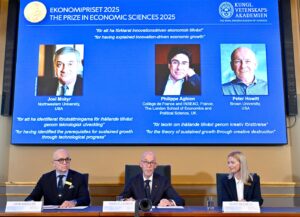‘Dream of a lifetime’: Canadian economist Howitt among Nobel winners in economics
By Canadian Press on October 13, 2025.
Canadian economist Peter Howitt, who is among a group of three researchers to win
this year’s Nobel Memorial Prize in economics, said he found out about the prize from a persistent Swedish reporter who called his wife’s phone early in the morning, even before the committee could reach him.
“It’s just the dream of a lifetime come true,” he said when reached early Monday. “We didn’t have any champagne in the fridge in anticipation of this.”
The Royal Swedish Academy of Sciences announced Monday that Howitt, along with Dutch-born Joel Mokyr and Philippe Aghion of France, received the prize for “having explained innovation-driven economic growth.”
Howitt and Aghion relied on mathematics to explain how creative destruction works, a key concept in economics that refers to the process in which beneficial new innovations replace — and thus destroy — older technologies and businesses. The concept is usually associated with economist Joseph Schumpeter, who outlined it in his 1942 book “Capitalism, Socialism and Democracy.”
Both economists studied the mechanisms behind sustained growth, including in a 1992 article in which they constructed a mathematical model for creative destruction.
Howitt said people often think creative destruction is inevitable and that new technologies, such as artificial intelligence, will certainly destroy jobs.
“The mass unemployment is always predicted from new technologies, and typically it doesn’t happen,” Howitt said during a news conference on Monday.
Historically speaking, he said technologies make workers more productive, even as some people get replaced by tech
advances along the way. But on the whole, the value of labour tends to go up with economic growth.
With a boom in AI investments, Howitt said the economy is in a “big shakeout period,” and no one knows yet the impact of creative destruction in the changing landscape.
“This is a conflict that’s going to have to be regulated,” he said.
“Private incentives in an unregulated market are not really going to resolve this conflict in a way that’s best for society.”
Howitt and Aghion’s model showed that markets with too few dominant companies can hinder innovation and growth — a concern that has been raised about industries such as telecommunications, social media platforms and airlines.
Their work found it was important to support people who are affected by changes while making it easy to move to more productive workplaces — to protect workers more than specific jobs. They also stressed the importance of social mobility, where a person’s profession or trade is not defined by their parents’ identity.
“The laureates’ work shows that economic growth cannot be taken for granted. We must uphold the mechanisms that underlie creative destruction, so that we do not fall back into stagnation,” said John Hassler, chair of the committee for the prize in economic sciences.
Howitt, 79, received his bachelor’s degree in economics from Montreal’s McGill University and his master’s degree from Western University in London, Ont. He is a professor of social sciences at Brown University in Rhode Island.
“Working in Canada was where I really cut my teeth as an economist,” Howitt said. “The atmosphere at Western University was the one that really taught me how to be a productive scholar.”
Western president Alan Shepard congratulated the economist, adding that Howitt’s work has transformed how we think about innovation and economic growth.
Half of the 11 million Swedish kronor (nearly US$1.2 million) prize goes to Mokyr and the other half is shared by Aghion and Howitt. Winners also receive an 18-carat gold medal and a diploma.
Prime Minister Mark Carney cheered the Canadian economist’s win on Monday.
“Canada is home to many of the world’s brightest minds,” he said in a statement on the social media platform X.
Carney said Howitt’s work is an example of Canadian ideas having a global impact.
Howitt said he was looking forward to celebrating the win with his co-author Aghion. The duo worked together for about 30 years, he said.
“I’m really looking forward to getting together with him, to celebrating with our family,” he said. “We have children all around North America, and we look forward to going to Sweden together.”
Howitt also warned of “dark clouds ahead” as trade disruptions continue.
He said the biggest problem Canada faces is political and it’s important to maintain open economic trade.
When markets get restricted, the cost of international trade gets more expensive — which eventually blunts the incentive to innovate, Howitt said.
“If one partner becomes restrictive, go out of your way to find other trading partners to keep that market open for potential innovators,” Howitt said.
“That’s, I think, the biggest lesson that our research has for a country like Canada,” he said.
Asked during a news conference about current trade wars and protectionism in the world, Aghion said that: “I am not welcoming the protectionist way in the U.S. That is not good for … world growth and innovation.”
The economics prize is formally known as the Bank of Sweden Prize in Economic Sciences in Memory of Alfred Nobel. The central bank established it in 1968 as a memorial to Nobel, the 19th-century Swedish businessman and chemist who invented dynamite and established the five Nobel Prizes.
Since then, it has been awarded 57 times to a total of 99 laureates. Only three of the winners have been women.
— With files from The Associated Press
This report by The Canadian Press was first published Oct. 13, 2025.
Ritika Dubey, The Canadian Press
37
-36





